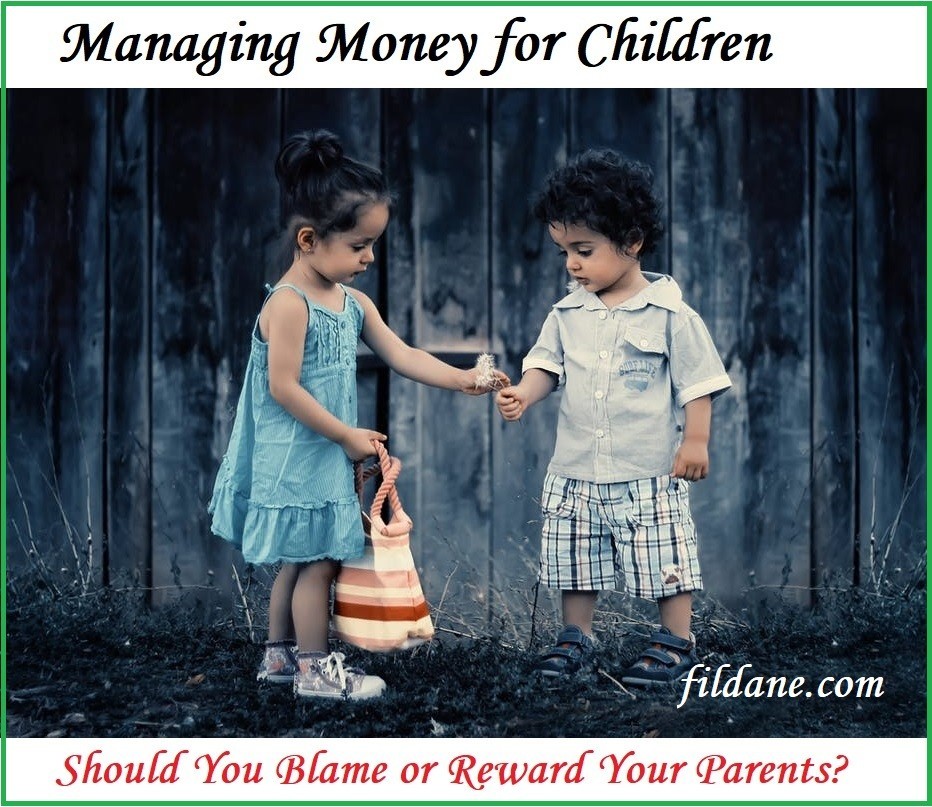
Financial literacy starts in childhood. Majority of the poor people are poor because of lack of financial literacy. And parents are primarily responsible for it. Oh yes, I said that and that’s true. Managing money for children is a serious responsibility for parents.
Let’s see if you’ll blame or reward your parents after reading this article.
So, when does financial education starts? If you are reading this article, it is probably because you know that financial literacy is very important to start as early as possible. But how early? What are the things that a little child should know about money?
As parents, we are mainly responsible for our own personal finances. But believe it or not, as soon as children are born, their personal finance begins as well. And as a parent, you’re in charge with it until your child reaches the legal age, more or less. And honestly, your finances will seem to become a little bit more complicated, when you get children.
Managing Money for Children – Should You Blame or Reward Your Parents?
What Are The Things We Generally Consider After Child’s Birth?
- Money/allowances from the government: if you are living in the 1st class countries like in the US, Europe, Australia etc., then you know that children get money from the government until they reach the legal age of 18.
- And there are a lot of other monetary benefits according to individual situations, i.e. child’s support, extra government monetary support for widows with minor children, etc.
- And you can name many types of expenses as soon as you get children, i.e. diaper, baby food, baby clothes, child’s care and institution, schooling, extracurricular activities, and the list goes on and on as the child gets older and older.
Why it is important to think about child’s finances so early is because it’ll ruin your own personal finances if you delay it.
In addition, your child will definitely learn how to manage money from you and you’ll pass your own financial legacy or literacy to your child. Obviously, this will create a great foundation for your child’s future.
What Are The Investments You Need to Consider For Your Child?

- Children’s savings account – There are basically 2 types of accounts you can favorably consider. Savings account with a binding period that offers fixed interest rates. And ordinary savings account when your child reached a certain age, wherein he/she needs to start to use bank cards.
- Children’s investments account – Investments are always advisable to start as early as possible. Not only because of the time period but also because of the tax benefit and exemptions for minor age.
- College/education plan – getting a college plan early gives an opportunity of lower premium or monthly contributions than if you delay it.
- Life/disability/medical insurance – Make sure you check and update your insurances as soon as you get children. Some insurance companies offer a free insurance for minor age as a primary insured person. And children’s insurances are otherwise cheaper than adult’s insurance but it will save you lots of money in case of unexpected circumstances.
- Pension plan: oh yes, I know you don’t expect this, but it is actually one of the trends for many years especially for those who are highly financially focused parents. Pension/Retirement plan for minors will give a child more freedom in the latter years. As the retirement system changes over time (negatively), you can secure the retirement benefit of your child getting retirement plans. Another thing is that this will maximize the usage of child’s and your own tax benefits by doing so.
Finances According to Ages:
The cost of raising a child increases every year because of the general inflation and the expenses need itself as a child gets older and older.
In fact, from 2000 to 2010, the cost of raising a child from birth to 17 rose 25%. In the US, according to Department of Agriculture, the average 2-parent, middle-income family with a child born in 2011 is now looking at around $235,000 to raise a child to 17, excluding the costs of pregnancy, childbirth or college. And with factors in expected/projected inflation, parents are now looking at around $300,000.
So let’s see how much does it cost to raise a child according to their ages.
Infants (0-12 months): Childcare, Diapers & Babyfood
We already know that raising a child is expensive and it varies according to which state or country you are living in. However, in the US, the urban Northeast is the most expensive place to raise a child, i.e. Manhattan, where parents spend almost $35,000 a year to pay for full-time daycare of a 1-year-old baby.
Aside from that, you can calculate more expenses for the diapers, baby food, baby clothes, strollers etc.
Toddler (12-36 months): Nursery, Daycare, and Early schooling.
The cost of childcare varies according to your lifestyle. However, it can be ridiculously expensive in the big cities. You can spend around $9,000 a year for a 2-year old toddler just for the childcare institution plus some other extracurricular activities, i.e. swimming and Spanish lessons.
Preschooler (Ages 3-5): Education & Health Care
The cost of preschool is likely the most shocking. Again, according to your lifestyle, the expenses for preschool can cost around $15,000 a year for example in Washington, D.C. And be careful when you pick which extracurricular and after-school activities, as these will tremendously sneak up on you very quickly. Some parents in the San Francisco Bay Area spends around $70,000 per year for sending their 3-year old twins to preschool.
And if you have a child with special needs then you can expect more expenses, that an health insurance doesn’t cover.
Elementary Schooler (Ages 5-10): Extracurriculars & Health Care
Aside from the cost of the school itself, sending your child to extracurricular activities at these ages increases your expenses enormously. At these ages, children are becoming more and more active and want to try different kinds of things like sports – like ballet, swimming, gymnastics, music, chess, horseback riding, martial arts etc.
And of course, the health and dental care are not to be disregarded.
Middle Schooler (Ages 10-13): Electronics
 Today, children at these ages (maybe earlier) start to use their own electronic gadgets like mobile phones, tablets, computers etc. Computer/laptop has become a basic need in going to school today, as the mode of teaching has become digital (majority). Obviously, children need a computer for their homework and mobile phones for a mode of communication.
Today, children at these ages (maybe earlier) start to use their own electronic gadgets like mobile phones, tablets, computers etc. Computer/laptop has become a basic need in going to school today, as the mode of teaching has become digital (majority). Obviously, children need a computer for their homework and mobile phones for a mode of communication.
High Schooler (Ages 13-17): Sports Teams and Clubs
Children at these ages are engaging with sports teams, more or less. Spending around $2,500 a year to cover team fees in high school is most likely normal. And plus the uniforms, transportation or gym membership.
When to Teach Your Children With Money?
The short answer is: as soon as they start to learn mathematics. Why? children are the most fast-learner and the foundation of learning the value of money can start very early too. If nobody teaches their children how to manage their money, who else? As we walked through about the above investments and finances for children, I hope you understand more how actually big your responsibilities are for your children.
Teaching them the value of money along the way will help your children to be more responsible as they grow older. Children will definitely take over their own finances one day. And the more financial literate they are, the more responsible they become as an adult.
So, If you take a look at your situation right now, will you blame or reward your parents on your financial illiteracy or literacy as a child that probably influenced you in managing your personal finances today? You can whisper it to yourself and say that you know your own children will definitely become financial literate.
Related Articles:
Top Five Financial Tips – For 60’s (Pre-Retirees MUST Aim For More Secure Retirement
Top Financial Tips – Catching Up for 50’s
Top Financial Planning Tips – For 40’s
Best Way To Manage Your Money at 30’s – 8 Steps
The Power Of Investing Early – 4 Tips For 20’s
I hope you enjoyed and learn something from the article. If you have any question, comment or other tips, please feel free to write them below. Good luck and God bless.







Hello Che,
I’m afraid I will blame my parents for lack of financial literacy, but I don’t want my kids to suffer the same.
I agree that parents should teach their children how to handle money. A strategy our family used was to determine how much money we expected to spend on a child, then explain to him or her how all that works. Depending on the child’s age, we then decided what part of that bugeted money we could delegate to that child, and let that child spend it appropriately. That’s real-world financial education. There are several good books detailing how this is done.
It worked for us and our kids, who are all grown now. Are you familiar with this strategy?
Great advice. Thanks for explaining so many things. And I have a question:
How will lack of preparing a child for using finances be a detriment to my own finances? You stated something like that in your article, but I’m not clear how that could happen.
I appreciate your input,
Laura
Hello Laura,
Thanks for stopping by. I’m glad you found the article interesting and you can really relate to it. And I’m glad you have very good financial insights and strategies for teaching children with money as early as possible. I love the practical facts that you practice at home, which is letting children handle money appropriately according to their ages. As well as the good books around – however, as you also mentioned, the real-world practice is always the best teacher- and parents, like you, should be rewarded.
“How will lack of preparing a child for using finances be a detriment to my own finances?”
I’m glad you asked this:
A child without financial literacy will most probably grow up being irresponsible on how they use their own money by using them with unnecessary things. Chances are, she/he will always turn to you whenever she/he needs to buy something that is really necessary. Then you don’t have a choice but to pocket out from your own finances. You can already start to see this when children become teenagers and the process will become worse as they get older and older. So, be cautious with that.
I hope this answers your question.
Best regards,
Che